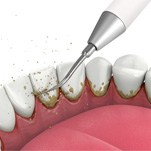Gum Disease Treatment – St. Johns, FL
Protect Yourself from Gingivitis and Periodontitis
Gum disease doesn’t often get as much attention as other oral health issues. Even so, it’s still a problem that you should take seriously going forward. This condition can seem benign at first, but it’ll greatly damage your mouth if left alone. Luckily, our office can provide you with great gum disease treatment. The service would help your gummy tissues recover their strength. If you’d like to learn more, simply keep reading or book a consultation with our office.
Why Choose Julington Creek Family Dentistry for Gum Disease Treatment?
- State-of-the-Art Diode Laser Therapy
- A Gentle Dentist Who Takes His Time
- Thorough, Experienced Dental Hygienists
What is Gum Disease?

Gum disease is a bacterial infection of your gums. It usually occurs due to a buildup of plaque, often as a result of poor oral care. Still, the condition does have other notable risk factors – genes, tobacco use, hormone changes, etc. That means people can be prone to it even with proper brushing and flossing.
Normally, gum disease emerges in two distinct phases. The first is gingivitis, which is a strong inflammation of the gum tissue. Such inflammation (if left unchecked) can lead to the second phase, known as periodontitis. The latter is an infection that destroys your gum and jaw tissues. Good oral hygiene can reverse signs of gingivitis, but periodontitis can only be managed at best.
Symptoms of Gum Disease

Given its nature, gum disease can have a wide range of symptoms. Which signs you display will depend on the severity of your case.
Take gingivitis, for instance. This stage of gum disease has symptoms like:
- Gum recession
- Gum swelling
- Bleeding gums
- Dark red gums
- Gum tenderness
- Chronic bad breath
On the other hand, periodontitis carries its own unique signs. These are:
- Loose permanent teeth
- Permanent tooth loss
- Tooth sensitivity (often due to gum recession)
- A shift in your bite
- Chewing pain
- Changes in your restoration’s fit
How Do We Treat Gum Disease?

At the initial consultation, Dr. Cohen will give you an oral exam. Doing so lets him see the state of your gums – their sensitivity, level of inflammation, etc. After assessing them, he’ll suggest suitable treatment options to you.
To treat gum disease, our office usually performs one (or more) of the following:
Scaling & Root Planing

Scaling and root planing are sometimes collectively referred to as deep cleaning. Unlike regular cleaning, this deep cleaning removes plaque, tartar, and bacteria from the gum pockets around your teeth. Scaling gets rid of these harmful substances, while root planing smooths your tooth roots so bacteria don’t build on them in the future. These two steps treat the current infection while also lowering your risk of a new one.
Do I Need Scaling & Root Planing?

This deep cleaning procedure is typically reserved for patients who are showing early indications of periodontal disease, such as swelling, inflammation, and bleeding in and around the gum tissue. If you’re experiencing any of these symptoms, our team will want to evaluate your situation so that we can detect the underlying cause.
Should we find that your gums are compromised, we’ll want to provide treatment right away with scaling and root planing to stop the progress altogether and avoid lasting damage to your smile. Not only will this treatment remove all debris, plaque, and tartar from beneath the gum line, but it’ll also promote improved healing so that your gums can reattach to your teeth more efficiently.
The Process of Scaling & Root Planing

Scaling and root planing usually occur through two steps—which means you’ll expect to undergo the process over two appointments. Firstly, scaling consists of scraping off tartar and plaque that have accumulated under or along the gum line. Our team will use special ultrasonic dental tools to perform this, effectively targeting the areas in the gum pockets where bacteria deposits have developed.
We’ll send you home to recover before asking you to return for the root planing process. This portion involves smoothing the surface of the teeth hiding beneath the gum line, allowing your gum tissue to stick to your teeth much easier and safer, as it’ll become more difficult for bacteria to accumulate again. This will also significantly lower your risk of forming gum disease later on.
Aftercare Tips for Scaling & Root Planing

It’s normal to experience some soreness and sensitivity after your scaling and root planing treatment. This is because your gums might be mildly inflamed. Fortunately, this should be short-lived and can recover after several weeks. Several tips to make your healing period smoother include:
- Rinsing your mouth with warm salt water to wash out debris and avoid irritation.
- Brushing carefully with a soft-bristled toothbrush and fluoridated toothpaste.
- Flossing thoroughly once a day or after meals.
- Eating softer foods for the first 48 hours following your treatment.
- Avoiding hot, spicy, or acidic meals.
- Refraining from intense physical exercise/activity immediately after your visit.
Laser Periodontal Treatment

We may opt for laser periodontal treatment if your gums are in really bad shape. Done after scaling and root planing, it uses a diode laser to get rid of infected gum tissue. This special laser only targets the infected parts of your gums and kills the bad bacteria on contact. As a bonus, its beam will also cauterize these tissues and reduce any bleeding. Your gums will thus recover more quickly and smoothly than they would’ve otherwise.
